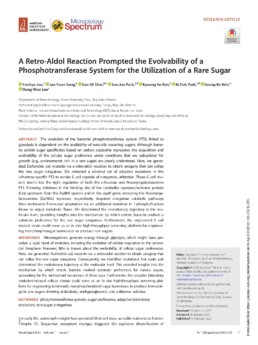A Retro-Aldol Reaction Prompted the Evolvability of a Phosphotransferase System for the Utilization of a Rare Sugar
Abstract
The evolution of the bacterial phosphotransferase system (PTS) linked to glycolysis is dependent on the availability of naturally occurring sugars. Although bacteria exhibit sugar specificities based on carbon catabolite repression, the acquisition and evolvability of the cellular sugar preference under conditions that are suboptimal for growth (e.g., environments rich in a rare sugar) are poorly understood. Here, we generated Escherichia coli mutants via a retro-aldol reaction to obtain progeny that can utilize the rare sugar D-tagatose. We detected a minimal set of adaptive mutations in the D-fructose-specific PTS to render E. coli capable of D-tagatose utilization. These E. coli mutant strains lost the tight regulation of both the D-fructose and N-acetyl-galactosamine PTS following deletions in the binding site of the catabolite repressor/activator protein (Cra) upstream from the fruBKA operon and in the agaR gene, encoding the N-acetylgalactosamine (GalNAc) repressor, respectively. Acquired D-tagatose catabolic pathways then underwent fine-tuned adaptation via an additional mutation in 1-phosphofructose kinase to adjust metabolic fluxes. We determined the evolutionary trajectory at the molecular level, providing insights into the mechanism by which enteric bacteria evolved a substrate preference for the rare sugar D-tagatose. Furthermore, the engineered E. coli mutant strain could serve as an in vivo high-throughput screening platform for engineering non-phosphosugar isomerases to produce rare sugars.
CategoryPeer-reviewed PublicationsDate2023.02Linkjournals.asm.org
